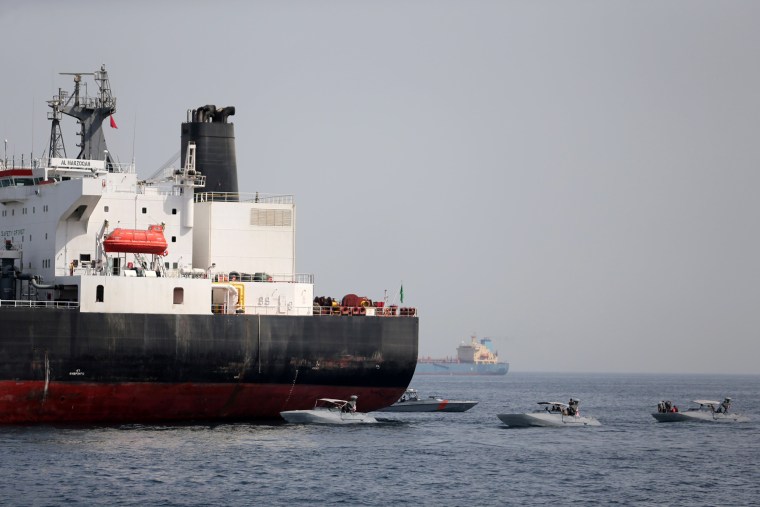A U.S. assessment determined it is "highly likely" that Iran was behind the attacks on four tankers last weekend, according to three U.S. officials familiar with the findings.
The U.S. has evidence, including photos of the damage and forensics, tying Iran or its proxies to the Sunday attacks off the coast of the United Arab Emirates, one of the officials said.
The four ships — two from Saudi Arabia and one each from the UAE and Norway — were struck with what is now believed to be explosive charges, the officials said.
The incident escalated tensions in the region at a time when the U.S. has ramped up its efforts to choke off Iran's oil experts. And in the days before the tanker attacks, the Trump administration announced that it was sending a carrier strike group and Air Force bombers to the Middle East.
A separate U.S. intelligence assessment on Friday found that the recent movement of more U.S. military assets into the region was having an effect on Iranian posture and behavior, according to the three U.S. officials.
The U.S. had been tracking Iranian dhows moving through the Persian Gulf and beyond, loaded with missiles and missile components, but the tensions on the regions waterways have eased in the last 24 hours, the officials said.
"Deterrence seems to be working in some areas," one official said.
But the official cautioned that Iran knows the U.S. is tracking its boats, so may be adjusting its posture in order to regain the element of surprise.
As a possible sign of the de-escalation at sea, two Navy guided-missile destroyers, the USS Gonzalez and USS McFaul, transited through the Strait of Hormuz and into the Persian Gulf Thursday without major incident, a U.S. Navy and U.S. official said.
Iranian boats frequently appear when American ships are transiting the narrow waterway, sometimes coming dangerously close and communicating threatening messages in bridge to bridge calls. With the Gonzalez and McFaul transit, the interactions were professional, the officials said.
The threat from Shia militias and proxies in Iraq remains high, the officials said, with one characterizing it as "unchanged" over the past few days.
Tensions remain high in Baghdad, where an unidentified drone sent the U.S. Embassy in Baghdad into lock-down for more than an hour on Thursday, according to two U.S. officials.
The unknown drone flew close to the embassy grounds, prompting a duck and cover alert for staff inside. Diplomatic security gave the all-clear around 3:30 p.m. local time, the official said.
A State Department official confirmed the incident and said the embassy returned to normal operations after security determined that the drone posed no danger to facilities or staff.
"This incident did not result in any injuries or damage to department facilities, and it was confirmed the (drone) did not present a threat," the State Department official said.


